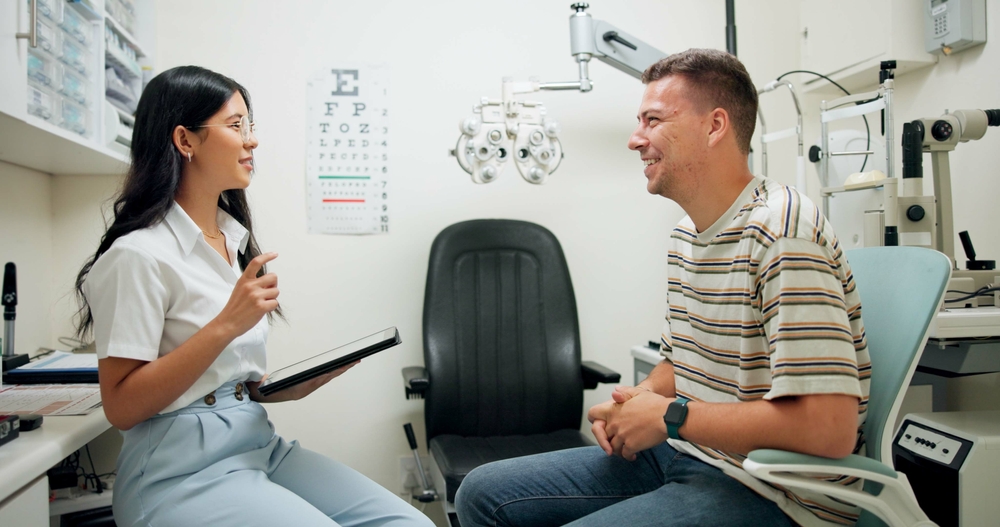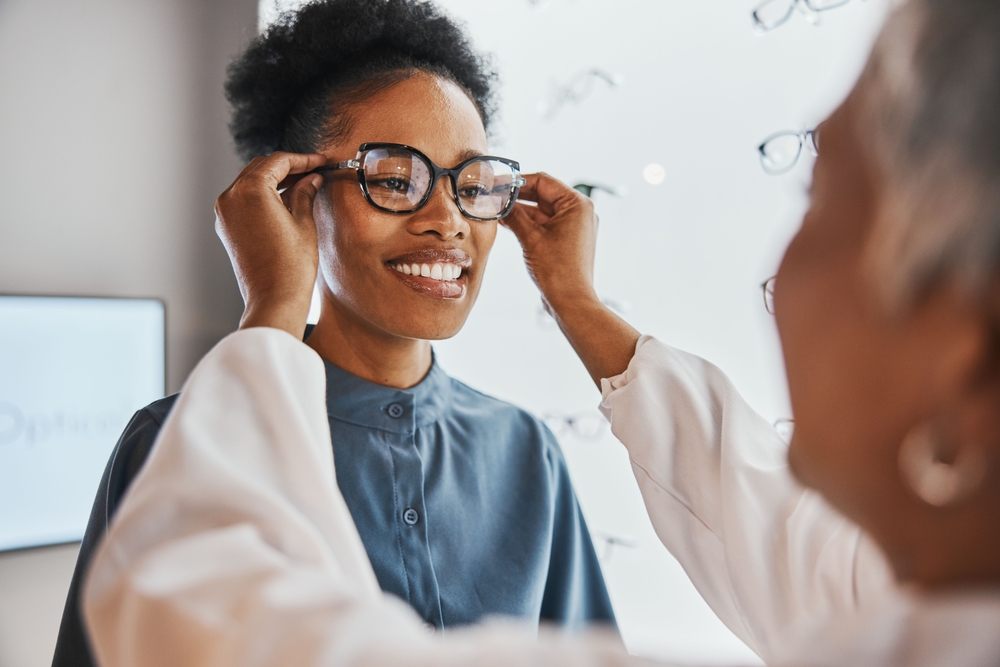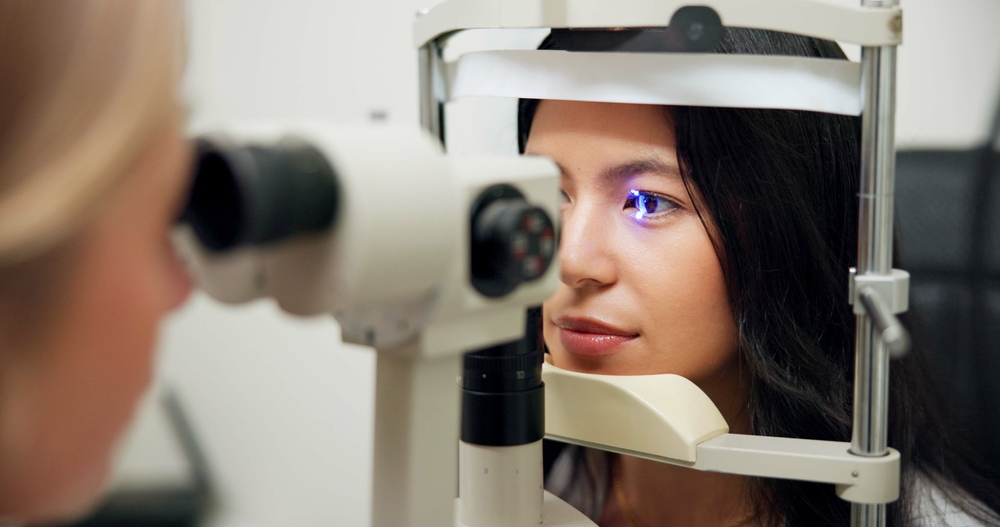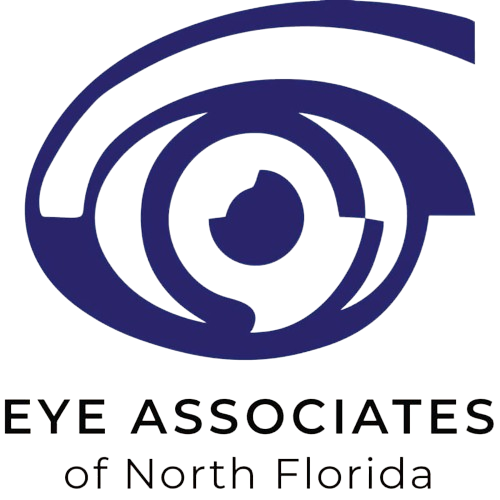How Often Do I Need to See My Eye Doctor?

Taking care of your eyes is part of maintaining good overall health. Periodically seeing your eye doctor ensures that you get important screenings for eye conditions and stay up to date on your visual needs.
How often you need comprehensive eye exams depends on your age, vision, and health history. The American Academy of Ophthalmology has created clear guidelines to help you plan your eyecare.
Keep reading to learn more about how often you need to see your eye doctor.
Eye Exams for Adults with Normal Vision

If you are an adult with no underlying health conditions and you don’t need glasses or contacts, you may not need to see an eye doctor every year. You should plan to have one comprehensive exam from an ophthalmologist in your 20s and two in your 30s.
Regardless of vision and health history, all adults should undergo a comprehensive eye exam at age 40. This is important even if your vision is still clear and your previous eye exams showed no signs of an eye condition.
The risk of developing many eye conditions increases after age 40. This is also an age when vision changes may appear for the first time.
Seeing an eye doctor can help you get an early diagnosis and treatment of any potential problems, ensuring you preserve as much of your vision as possible. As your chance of developing an eye condition increases with age, adults 65 or older should have comprehensive eye exams every year.
Eye Exams for Adults with Glasses, Health Conditions, or Eye Conditions
If you wear glasses or contacts, have certain underlying health conditions, or have an eye condition, you will need to undergo eye exams more often. Some factors that can indicate you need more frequent eye exams include:

Glasses or Contacts
If you wear glasses or contacts to correct your vision, you should have an eye exam yearly. Your vision may change over time, meaning you should stay up-to-date on your prescription to ensure you are seeing as clearly as possible.
Diabetes
Patients with diabetes are at risk for an eye condition called diabetic retinopathy. It occurs when blood sugar increases and damages the retina’s blood vessels, leading to vision problems and loss.
Diabetes can also increase your risk for other eye conditions like glaucoma and cataracts. If you have diabetes, you should be screened for diabetic retinopathy and other eye conditions every year.
If you have an existing diagnosis of diabetic retinopathy, your eye doctor may want to see you even more frequently to monitor the condition.
Eye Conditions
If you or your family have a history of eye conditions, such as glaucoma, you should see your eye doctor at least once a year to screen for signs of the condition. Depending on the nature of your condition, you may need several exams per year.
Glaucoma often does not present with symptoms early on, making it difficult to detect without an eye exam. Once visual damage has occurred, it is irreversible, meaning early detection is essential for effective treatment.
Emergency Situations
If you sustain an eye injury or have symptoms of an eye infection, such as eye pain, redness, swelling, or discharge, you should immediately get medical attention. You may need to see your primary care doctor or go to an urgent care facility for immediate treatment.
Once the emergency is taken care of, you should schedule a follow-up exam with your eye doctor at Eye Associates of North Florida so they can assess the condition of your eyes and determine if any further treatment is required. You should also let your eye doctor know if you have changes to your vision, such as floaters or flashers.
What Can I Expect During an Eye Exam?
Eye exams are non-invasive, painless, and do not take long to complete. Your eye doctor will walk you through each test and answer any questions along the way to ensure you are fully informed and feel comfortable.
A comprehensive eye exam may include tests and exams such as:

Dilated Eye Exam
During a dilated eye exam, your eye doctor will give you eye drops to dilate your pupils. When the pupil is fully expanded, your eye doctor uses lights and magnifying tools to see the inner structure of the eyes.
You will sit in front of a device called a slit lamp, which is a specialized binocular microscope. The device offers a magnified view of the eye so your eye doctor can identify signs of conditions such as cataracts, corneal problems, glaucoma, retinal problems, and dry eye.
Eye Pressure Test
Increased intraocular pressure or eye pressure can be an indication of glaucoma. Untreated glaucoma is one of the leading causes of preventable blindness in the world, though early detection and treatment can help prevent vision problems.
Glaucoma screening involves a test called applanation. Your eye doctor will give you numbing eye drops that contain a special dye, and then you will look into a device that uses blue light to measure your eye pressure.
Ocular Motility
Your eye doctor can perform an ocular motility test to check your eyes’ motility and see how well they move together. This is a simple test where your eye doctor will ask you to move your eyes in all directions.
Visual Acuity Testing
Visual acuity testing checks how well you can see objects at different distances. You will cover your eyes one at a time and read off of an eye chart.
Testing for visual acuity lets your eye doctor know if you need glasses or contacts to improve your vision.
Refraction
If you need glasses or contacts, refraction testing can determine what prescription you need. Your eye doctor will have you look through a device called a phoropter so you can try out different degrees of correction to find the best one.
Is it time for you to have a comprehensive eye exam? Schedule an appointment at Eye Associates of North Florida in Tallahassee, FL, today!







